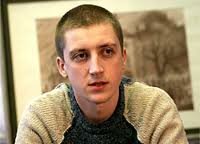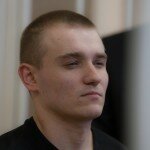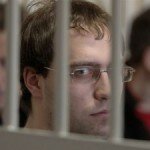
Artur Finkievich, former political prisoner, „the malicious infriger of regime”, founder and leader of „Young Belarus” movement recounts his stay and living conditions in prison on palitviazni.info website.
Artur was painting political slogans on building and was arrested just when he had run out of paint. ’If you can’t find somebody to work with, you have to act on your own’ said former vice-president of theYoung Front. In was the year 2006 and the beggining of presidential campaign. A lawyer advised the activist to plead guilty and this allowed the colleague of Finkievich, who was arrested with him, to remain at large. Now the grown-up Artur has a different opinion on a political graffiti:
‘Painting on walls itself is not a good idea, even though I was put in jail because of it. It’s not pleasant to have slogans written on your house, even fully correct, even if there is no other way to reach people’.
– Artur, where did you serve your sentence? Do you feel any pressure from the authorities, militia, the KGB?
Artur Finkievich: I was arrested on the 31st of January 2006 and on 3rd of February they transferred me to Wolodarka where I was held for 3,5 months. The hearing was conducted in May, after the presidential election. They were deliberating for 2 days and I got 2 years of „chemistry”. I served my sentence in Mogilev headquaters nr 43, where they were pushing me so hard that sometimes I couldn’t bear it. By all means I tried to go to hospital and I was hurting myself just to get in there. I would spend 3 months in hospital simply not to come back.
I was given reprimends, for example for misleading the way while coming back from work and being 13 minutes late. And I only had 15 minutes to make the way to headquaters! Nothing like that has ever happened to any of my friends – not to Mazejka nor Statkiewicz, Iwaszkiewicz and Siewiryniec. Because of those 15 minutes I couldn’t go to the shop or wash myself after work.
During the second investigation the KGB offered me a chance of cooperation and therefore a freedom if I would testify against my friends: Dzmitrij Fiedoruk, Iwan Szydlo and others. But even though they took all my phones I was able to warn my friends.
– How did it happen that during your detention another criminal case was built against you?
Artur Finkievich: Three weeks were left to the end of my sentence and they built a case against me, as a malicious infriger of regime, under the article 415 of Belarusian Criminal Code – ‘violation of the conditions of a freedom restriction’ which I did in fact violate. I was sentenced to 1,5 years of imprisonment in a penal colony. Then I spend the next 3,5 months in Mogilev custody suite nr 4 waiting for my appeal to be concluded. They put me under pressure back there, they forced me write a statement to transfer me to the penal colony as soon as possibile.
-Artur, can you describe in more details the conditions of detension, prison conditions, number of people in cells?
Artur Finkievich: In custody suite on Wolodarki Street in Minks I had to spend 3 days in so-called „waiting room”, a 6m to 4m size cell. There was a ‘stage’, a toilet – ‘luza’ and a tap, which weren’t separated. Around 27 people were there, in the period of three days, from Friday to Monday, and they were forced to sit or stand because it wasn’t possible to walk or sleep.
Usually there are twice too many people in cells, for example 30 people where there are only 18 places. People are sleeping one after the other and it’s not comfortable. Human rights defenders call this a torture and maybe it is like that but sometimes prison administartion can create even worse conditions, even where the number of places is bigger then the number of lodgers. When me and some other people wanted to write request application for transferring from Mogilev custody suite to the colony we were put in an empty cell where there was 8 beds for the 5 of us. But temperature was below zero degrees, due to broken windows, and the cell was in the basement. I spend two weeks there. They let me go after a cassation appeal, and the judgement was 6 months and 20 days of restriction of libery. Then in 2008 the dialogue-trade started and within a month they released few political prisoners, with me among them.
– I understand that you werent made to write a pardon request, there were other priorities. But can you compare your detention conditions with conditions of current prisoners?
Artur Finkievich: About those tortures which were happening in ‘Amerykanka’ in 2010-11, when prisoners were told to run up the stairs and undress in the middle of the night… I was in shock. In 2006 prisoners were taken for a stroll and they had to walk between masked soldiers standing in different parts of the corridor, who beat them with batons. Then of course people didn’t want to go for a stroll. And when in 2006 the election was over, „the masks” vanished. I don’t know if those two things had something in common.
– Artur, when you were mentioning your stay in prison you were smiling from time to time. Why? Isn’t it dreadful to recall those hard times you had?
Artur Finkievich: After my prison term I had even worse accidents, like when they broke my legs just in front of my house, put a bag on my head, tossed me into the bus and, within three hours, drove off to the forest and beat. After something like that, when you’re left in the forest 150 km away from Minsk, the penal colony really seems like a softer option.
This whole prison system was created to break and humiliate a man. To destroy everything what connects him with a civilised world, with clear thinking, with regular life. The system is meant to break people, to make slaves out of them. And this system affects not only political prisoners but other prisoners as well, sometimes those wrongly accused.
– In your opinion what measures needs to be taken to release people convicted for political reasons?
Artur Finkievich: It needs a complex action: international pressure and internal actions – informing people that such things as political prisoners exists and that every one can be among them.
I talk about political prisoners on every meeting I’m in, this is one of the most painful topics in Belarus. You can’t forget about it, because if we keep forgeting about each other, eventually they will forget about us all.




